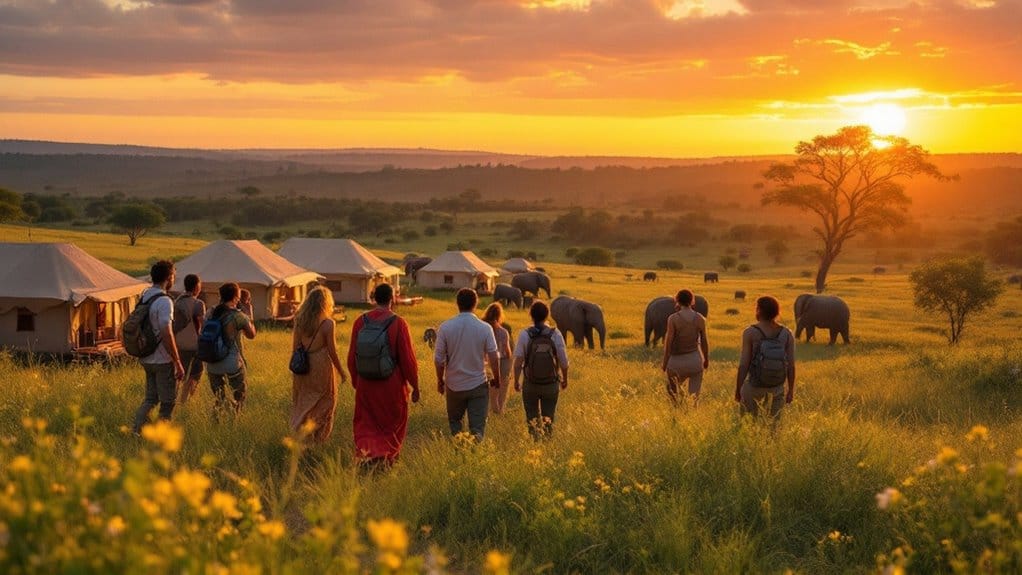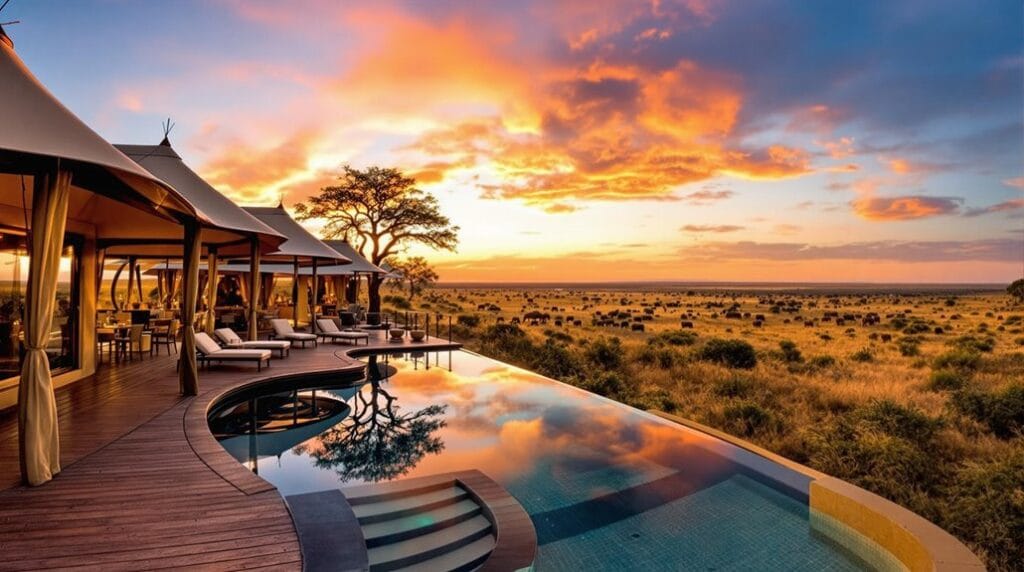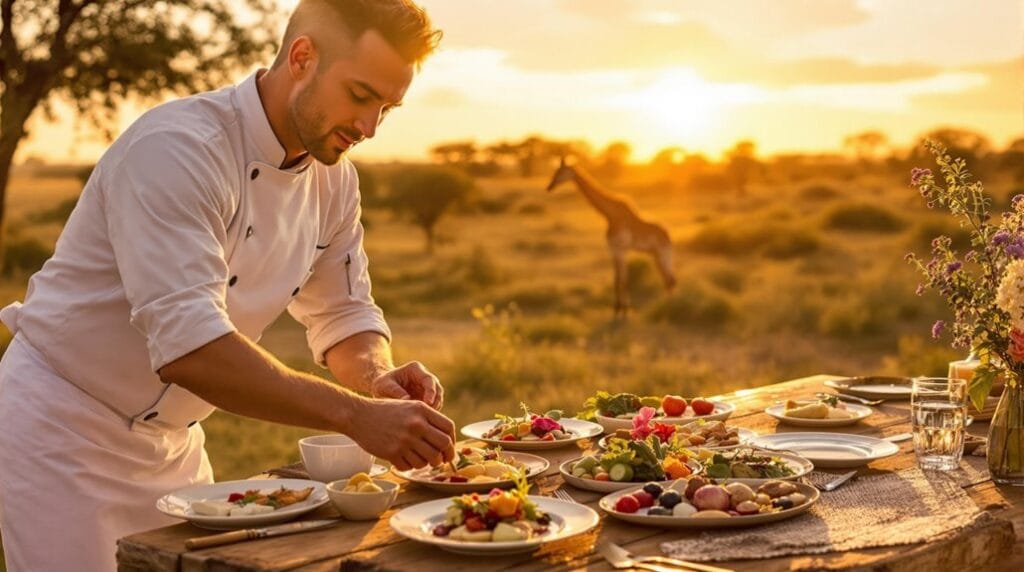You might not realize that sustainable safaris can greatly transform local communities by intertwining ecological conservation with economic growth. These initiatives not only protect wildlife but also create diverse job opportunities for residents, allowing them to thrive beyond traditional farming. By participating in these safaris, you support local artisans and guides who play an essential role in preserving their cultural heritage. What you may not know is how these efforts can reshape the landscape of responsible tourism, leading to profound impacts on both communities and ecosystems.
Key Takeaways
- Sustainable safaris create job opportunities for locals in guiding, hospitality, and artisan crafts, enhancing economic stability within communities.
- Tourism revenue from safaris is reinvested into community projects, improving education, healthcare, and infrastructure for local residents.
- Local communities actively participate in wildlife conservation, fostering environmental stewardship and pride through sustainable safari practices.
- Cultural heritage experiences during safaris encourage respect for local traditions and provide additional income for communities through cultural preservation projects.
- Engaging travelers with local customs promotes deeper connections, fostering mutual respect and understanding between visitors and residents.
Unique Botanical Experiences in South Africa
In the heart of South Africa lies the Grootbos Private Nature Reserve, a haven for botanical enthusiasts keen to explore its rich biodiversity. Nestled within the Cape Floral Kingdom, this unique destination boasts over 9,000 vascular plant species, with more than 800 recorded right on the reserve. From June to November, you can witness the stunning bloom of proteas, a key feature of the region's diverse flora.
Your visit to Grootbos isn't just about witnessing nature's beauty; it's also a chance to engage with local communities. The Grootbos Foundation plays a pivotal role in supporting these communities by providing horticulture training and helping create sustainable businesses.
By participating in guided tours and workshops, you contribute to both conservation efforts and community empowerment, fostering a sense of belonging and shared purpose.
As you explore the trails and immerse yourself in the unique botanical heritage of South Africa, you're not only discovering a remarkable ecosystem but also actively participating in a meaningful cause.
Together, we can help create a sustainable future that honors both the environment and the vibrant local cultures that thrive within it.
Cultural Heritage in Ghana
Ghana boasts a vibrant tapestry of cultural heritage that invites you to explore its rich traditions and artistry.
You'll find that engaging with local residents fosters a deeper connection to their customs and crafts.
Here are three experiences you shouldn't miss:
- Kente Cloth Weaving: Discover the intricate process of weaving kente cloth, a symbol of Ghanaian identity. Local artisans passionately share their skills, ensuring these traditions thrive.
- Bead-Making in Krobo: Visit the Krobo region to see how artisans transform recycled glass into stunning hand-painted trade beads. This community project not only preserves artistry but also promotes sustainability.
- Cacao Experiences: Immerse yourself in the world of cacao production by connecting with local farmers. Learn about chocolate-making and understand its significance in Ghana's culture.
Supporting Education in Uganda
Education serves as a powerful catalyst for change in Uganda, where a significant portion of the population still faces literacy challenges. With a literacy rate of just 80%, lower than its neighbors Kenya and Tanzania, the need for educational support is clear.
By engaging with local schools through community volunteering trips organized by Tribe Travel, you have the opportunity to make a real difference.
Visiting schools like the One Love Project allows you to witness firsthand the efforts to build and renovate facilities, enhancing educational access for local students. Your involvement not only helps improve literacy but also empowers local people with the skills and knowledge necessary for sustainable livelihoods.
These experiences foster cultural exchange, deepening your understanding of the challenges faced by Ugandan children. They also promote awareness about the transformative power of education, encouraging you to become an advocate for change.
The Maasai and The Great Migration
When you think about the Great Migration, it's essential to recognize the integral role the Maasai play in this natural spectacle.
Their rich cultural practices not only enhance the area's appeal to tourists but also support vital wildlife conservation efforts.
Maasai Cultural Integration
Cultural richness thrives in the vibrant landscapes of Maasai Mara, especially during the Great Migration, when thousands of wildebeest and zebras traverse the plains.
This annual spectacle offers an incredible chance for Maasai cultural integration, empowering local communities to benefit from eco-tourism. When you engage with the Maasai, you're not just observing wildlife; you're participating in a living culture.
Here are three ways you can connect with the Maasai community during your visit:
- Stay in Conservancies: Choose accommodations like Isaaten, where your stay directly supports local Maasai pastoralists, ensuring sustainable livelihoods while promoting conservation.
- Cultural Exchanges: Participate in cultural experiences, learning about traditional Maasai customs and practices, fostering mutual respect and understanding.
- Support Education: Through guest sponsorships from safari lodges, you can contribute to local education initiatives, such as supporting children at Nkoilale School, ensuring a brighter future for the community.
Wildlife Conservation Efforts
The Maasai Mara's breathtaking scenery isn't just a backdrop for the Great Migration; it's living proof of the symbiotic relationship between wildlife and local communities. Each year, thousands of wildebeest and zebras journey through this vibrant ecosystem, creating a dynamic that supports both animal conservation and the livelihoods of the Maasai people.
By choosing to stay on conservancies, you help guarantee that local pastoralists benefit directly from tourism activities, fostering a sustainable economic model that empowers them.
Moreover, your involvement can extend beyond mere observation. Sponsoring local schools, like Nkoilale, directly contributes to the education of children, nurturing future generations and promoting community development.
Environmental initiatives led by luxury tented camps, such as Mara Bushtops, focus on protecting natural habitats while enhancing your visitor experience.
Through these wildlife conservation efforts, tourism funds play a crucial role in supporting anti-poaching units and wildlife research, guaranteeing the region's biodiversity remains intact.
Community Engagement in Conservation
Engaging local communities in conservation efforts not only fosters a deep sense of pride but also cultivates responsibility toward protecting their natural environment.
When you support sustainable safaris, you empower these communities to take charge of their wildlife and habitats.
Here are three key benefits of community engagement in conservation:
- Skill Development: Local safari operators provide training programs that equip community members with essential resources and skills for sustainable practices. This enhances local stewardship and guarantees they can actively participate in conservation.
- Economic Incentives: By reinvesting tourism revenue into community projects, residents can enjoy better education and healthcare. This creates a sustainable loop of benefits, improving livelihoods while protecting the environment.
- Cultural Heritage: Community engagement in safaris allows locals to showcase their traditions and crafts, generating additional income. This not only promotes cultural preservation but also strengthens community ties.
When you choose to engage with local safari operators, you help create a thriving ecosystem where both nature and communities flourish together.
It's about belonging, pride, and a shared commitment to conservation.
Sustainable Practices in Safari Tourism
Supporting local communities through sustainable safaris goes hand in hand with adopting eco-friendly practices that minimize environmental impact. When you choose a safari lodge committed to sustainability, you're not just experiencing nature; you're actively participating in the protection of it.
Many lodges implement water and food recycling initiatives, which greatly reduce waste and promote responsible resource management.
As you explore the wilderness, remember that your visit helps create diverse job opportunities for local communities, improving living standards and alleviating poverty. Revenue generated from safari tourism often gets reinvested into essential community projects like education, healthcare, and infrastructure, enhancing the overall quality of life for the people who call this beautiful place home.
Moreover, training programs for local guides empower community members with skills that promote sustainable practices. This not only benefits the environment but also lays the groundwork for long-term economic stability.
Economic Empowerment Through Tourism
Empowering local communities through safari tourism creates a ripple effect of economic benefits that transcend mere job creation. By engaging with this vibrant industry, you support the growth of local economies and help uplift those around you.
Here's how safari tourism fosters economic empowerment:
- Job Creation: Safari tourism generates significant employment opportunities in roles like ground teams, drivers, local guides, and lodge management, reducing reliance on agriculture.
- Skill Development: Working in the safari industry fosters skill acquisition, enabling individuals to enhance their careers and achieve economic stability.
- Infrastructure Improvements: Revenue from tourism contributes to essential infrastructure development, including better roads and healthcare facilities, benefiting both tourists and local communities.
These elements not only improve living standards but also help reduce poverty levels, allowing local populations to thrive while preserving their cultural heritage.
When you choose sustainable safari experiences, you're investing in a model that prioritizes community growth and economic upliftment.
Together, we can create a future where local communities flourish, supported by the very tourism experiences that connect us to nature and each other.
Impact of Responsible Travel
When you choose responsible travel, you're not just enjoying nature; you're also opening doors for economic empowerment in local communities.
Your visits can help preserve cultural heritage, allowing communities to share their traditions while benefiting financially.
Additionally, your support fosters community development initiatives that lead to lasting improvements in education and healthcare for future generations.
Economic Empowerment Opportunities
Sustainable safaris offer a pathway to economic empowerment for local communities, transforming the way they engage with their environment and economy. By participating in responsible travel, you help preserve not just wildlife but also the livelihoods of local people.
Here are three key economic empowerment opportunities that arise from safari tourism:
- Job Creation: Safaris generate diverse employment opportunities in guiding, hospitality, and artisan crafts, reducing reliance on agriculture and fostering community growth.
- Skill Development: Working in the safari industry equips locals with valuable training and experience, enabling them to pursue professional growth across various sectors.
- Infrastructure Improvement: The revenue from tourism supports essential infrastructure, including roads and healthcare facilities, benefiting both tourists and local residents.
Through responsible travel, you contribute to improved living standards and reduced poverty levels, ensuring that communities thrive alongside wildlife conservation efforts.
This approach not only uplifts local populations but also creates a deeper connection between travelers and the places they visit, fostering a sense of belonging and mutual respect.
Embracing sustainable safaris means you're part of a movement that empowers communities, preserves their environment, and enriches your travel experience.
Cultural Heritage Preservation
In recent years, responsible travel has emerged as an essential tool for cultural heritage preservation, allowing you to engage directly with local traditions and practices. When you set off on a safari, you're not just a tourist; you're a participant in the rich tapestry of cultural heritage that communities that call these regions home endeavor to maintain.
Through cultural tours and interactions, you help foster respect for their traditions while promoting economic opportunities. As you explore local customs, you contribute to a dialogue that enhances mutual understanding and appreciation of diverse heritages. Your interest incentivizes communities to showcase their practices, ensuring these traditions aren't only preserved but celebrated.
Every interaction you have becomes a learning experience, enriching your journey while supporting the continuation of these essential cultural narratives. Moreover, responsible tourism initiatives often direct a portion of their revenues toward cultural preservation projects.
This means that as you travel, you're not just enjoying the experience; you're actively participating in sustainable development that safeguards cultural heritage for future generations. Together, we can create a world where cultures flourish and thrive, and where every traveler feels a sense of belonging.
Community Development Initiatives
Responsible travel plays a pivotal role in transforming local communities, creating opportunities that empower residents and elevate their quality of life. By participating in sustainable safaris, you support community development initiatives that not only enhance the local economy but also foster a sense of belonging among residents.
Here are three key impacts of responsible travel:
- Job Creation: Safaris generate diverse employment opportunities, from local guides to lodge managers, directly reducing poverty and improving living standards.
- Infrastructure Investment: Revenue from safari tourism often funds essential local infrastructure, such as roads, healthcare facilities, and educational institutions, enabling better access to services for both tourists and residents.
- Wildlife Conservation Engagement: Community involvement in wildlife conservation fosters pride and stewardship among locals, encouraging them to protect their natural environment while benefiting from its resources.
When you choose a responsible safari, you're not just enjoying an adventure; you're actively contributing to community development and helping preserve cultural heritage.
Your travel choices can create a lasting impact, ensuring that local communities thrive for generations to come. Embrace this journey of empowerment and connection.
Frequently Asked Questions
How Can I Find a Sustainable Safari Operator?
To find a sustainable safari operator, start by researching companies that prioritize responsible tourism and ethical practices.
Look for operators that support local communities and wildlife conservation.
Check reviews and certifications to verify they align with your values.
Engaging with community forums or social media groups can also provide recommendations.
What Is the Average Cost of a Sustainable Safari?
The average cost of a sustainable safari typically ranges from $150 to over $1,000 per person per day, depending on the level of eco-friendly accommodations and the extent of community engagement involved.
You'll find that higher-end options often provide luxurious stays while supporting local initiatives.
Are There Age Restrictions for Participating in These Safaris?
When considering age restrictions for safaris, it's essential to check with specific operators, as guidelines can vary.
Many safaris welcome family participation and encourage youth engagement, offering programs designed for younger adventurers.
Some may have minimum age requirements for safety reasons, while others might provide family-friendly experiences.
Engaging children in nature fosters a sense of belonging and appreciation for wildlife, making it a rewarding experience for everyone involved.
How Do Sustainable Safaris Impact Wildlife Conservation Efforts?
Sustainable safaris greatly impact wildlife conservation efforts by promoting wildlife preservation through eco-friendly practices.
When you choose these experiences, you support initiatives that protect natural habitats and endangered species. Local communities often become stewards of their environment, fostering a sense of belonging and responsibility.
Can I Volunteer During a Sustainable Safari Experience?
Imagine stepping into a vibrant tapestry where every thread represents a community's story.
Yes, you can definitely volunteer during a sustainable safari experience! Many programs offer opportunities for community engagement, allowing you to contribute meaningfully while learning about local cultures.
Conclusion
By choosing sustainable safaris, you're not just enjoying breathtaking landscapes and incredible wildlife; you're directly uplifting local communities. Some may worry that tourism harms nature, but responsible travel actually fosters conservation and empowers locals. Your visit helps create jobs, supports education, and preserves cultural heritage. Together, we can guarantee that tourism benefits both travelers and the communities we explore. So, step into this journey, knowing you're making a positive impact on people and the planet.








